
Not every plant in your yard needs to lose its petals and foliage when winter comes. Bright reds, soft pinks, sunny yellows –– these colors can still pepper your lawn, even when there’s snow. You just need winter flowers that bloom in the cold.
- 10 winter flowers that bloom in the cold
- 1. Algerian Iris (Iris unguicularis)
- 2. Camellia (Camellia japonica)
- 3. Christmas Roses (Helleborus)
- 4. Cyclamen (Cyclamen)
- 5. Daffodil (Narcissus)
- 6. Pansy (Viola x wittrockiana)
- 7. Snowdrop (Galanthus elwesii)
- 8. Winter Daphne (Daphne odora)
- 9. Winter Jasmine (Jasminum nudiflorum)
- 10. Witch Hazel (Hamamelis mollis)
- FAQ about winter flowers that bloom in the cold
10 winter flowers that bloom in the cold
1. Algerian Iris (Iris unguicularis)
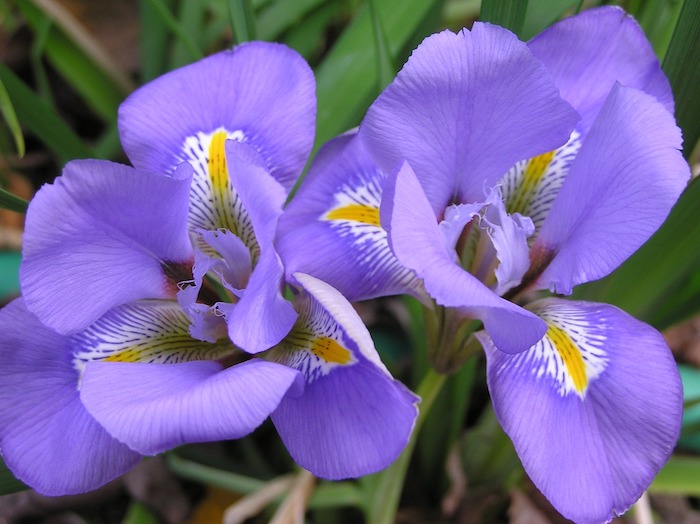
These lovely lilac-colored blooms will turn any gray, murky yard into a cozy, beautiful garden. Place this flowering plant near walkways or near patios where it can be admired when its fragrant and delicate flowers appear in late winter.
Cut the Algerian iris’s stalk and feature the flower in your favorite vase to bring life back to your freezing hallways. Be sure to place this beautiful bouquet in a high-traffic hallway so everyone can enjoy its sweet scent.
Plant type: Bulb, perennial
USDA Hardiness Zone: 7-9
Flower color: Gold/yellow, purple/lavender
Flower bloom season: Winter, Spring
Attracts: Butterflies, hummingbirds, pollinators
Fragrant: Yes
Maintenance: Low
Light: Full sun, partial shade
Soil texture: Clay, loam, sand
Soil pH: Alkaline, neutral
Soil drainage: Good, moist
2. Camellia (Camellia japonica)
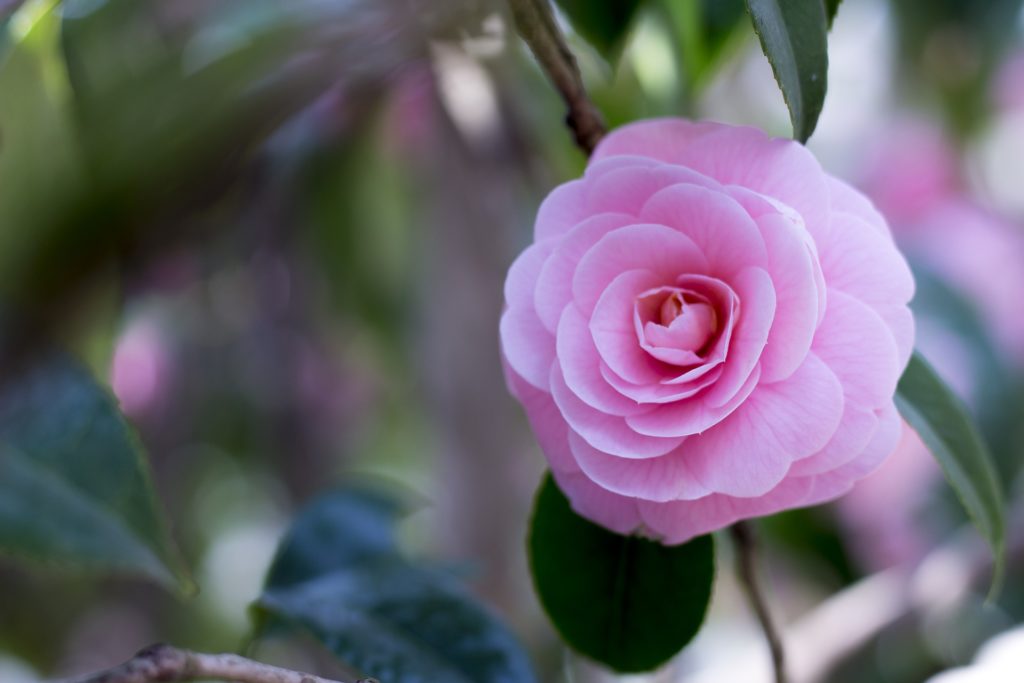
Camellias are famous for their magnificent blooms. These evergreen shrubs feature thick, serrated, and glossy leaves throughout the year, and surprise us with their breathtaking and often brightly colored flowers as temperatures drop. These shrubs can grow between 10 to 13 feet tall, making them quite the spectacle in your winter wonderland.
Plant type: Shrub
USDA Hardiness Zone: 7-9
Flower color: Gold/yellow, pink, red/burgundy, white, variegated
Flower bloom season: Winter, Spring
Attracts: Pollinators, songbirds
Fragrant: No
Maintenance: High
Light: Partial shade
Soil texture: High organic matter
Soil pH: Acid
Soil drainage: Good, moist, occasionally wet
3. Christmas Roses (Helleborus)

If your shade garden is looking a little lonely throughout the winter months, consider growing Christmas roses. These wintery blooms will flower in late winter or early spring and are long-lasting, blooming for a month or more.
This low-maintenance herbaceous perennial belongs to the buttercup family and has 15 different species. These flowers will bring winter colors of cream, green, pink, purple, red, and white to your otherwise dormant garden.
Plant type: Herbaceous perennial, perennial
USDA Hardiness Zone: 5-8
Flower color: Cream/tan, green, pink, purple/lavender, red/burgundy, white
Flower bloom season: Winter, Spring
Fragrant: No
Maintenance: Low
Light: Partial shade
Soil texture: High organic matter, loam
Soil pH: Alkaline, neutral
Soil drainage: Good
4. Cyclamen (Cyclamen)
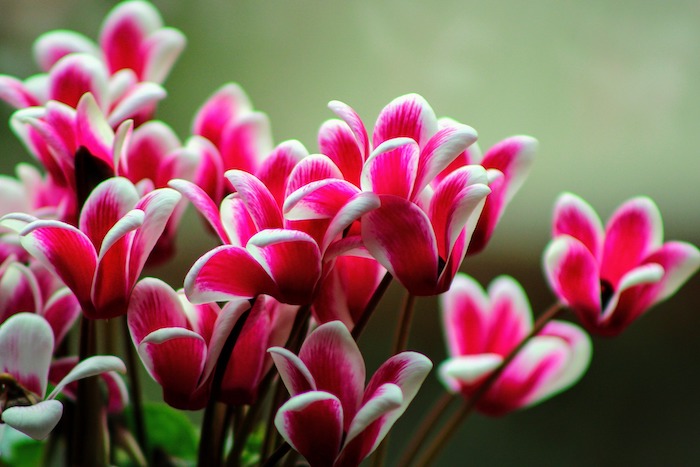
These vibrant pink and red flowers are a real joy when flowers become a scarce delight in the winter. You can even enjoy them as houseplants. Their delicate petals are under an inch tall on top of long, fragile stems.
Cyclamen may seem weak by its dainty-looking blooms but it’s actually quite a tough plant and will survive temperatures that drop almost to freezing at night. This plant also gives off a spicy scent reminiscent of lilies or roses with a hint of pepper.
Plant type: Bulb
USDA Hardiness Zone: 4-11
Flower color: Pink, purple/lavender, red/burgundy, white
Flower bloom season: Fall, Winter, Spring
Attracts: Bees
Fragrant: Yes
Maintenance: Medium
Light: Partial shade
Soil texture: Loam
Soil pH: Acid, neutral
Soil drainage: Good
5. Daffodil (Narcissus)
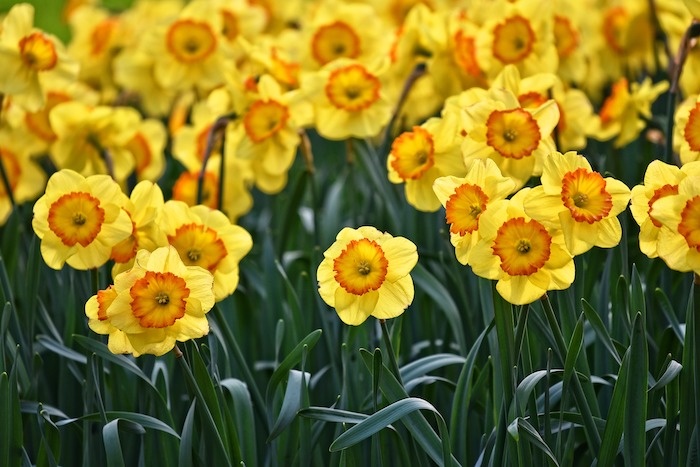
When these trumpets pop up from the snow, you know warmer temperatures are on the way. These bright-colored flowers with their fun petal shapes put spring in all our minds as we scrape morning frost off the car or slip on an extra pair of wool socks.
These fast-growing, fragrant perennials are great to use in flower beds, rock gardens, and as borders or ground covers.
Plant type: Bulb, ground cover, perennial, poisonous
USDA Hardiness Zone: 4-8
Flower color: Gold/yellow, orange, pink, white, variegated
Flower bloom season: Winter, Spring
Fragrant: Yes
Maintenance: High, low, medium
Light: Full sun, partial shade
Soil texture: Clay, high organic matter, loam, sand
Soil pH: Acid
Soil drainage: Good
6. Pansy (Viola x wittrockiana)

Pansies are a semi-evergreen annual part of the violet family that thrives in cool weather with their soft, perfume-like scent. They can be grown in all continental USDA Plant Hardiness Zones but will flower all winter in zones 8-10.
These dazzling flowers will liven up your garden by bringing bright shades of blue, yellow, purple, and red into your landscaping. These colorful flowers are also edible, making them excellent garnishes.
Plant type: Annual
USDA Hardiness Zone: 6-10
Flower color: Blue, gold/yellow, purple/lavender, red/burgundy, white
Flower bloom season: Fall, Winter, Spring
Attracts: Butterflies
Fragrant: Yes
Maintenance: Medium
Light: Full sun, Partial shade
Soil texture: Clay, high organic matter, loam, sand
Soil pH: Acid, alkaline, neutral
Soil drainage: Good, moist
7. Snowdrop (Galanthus elwesii)
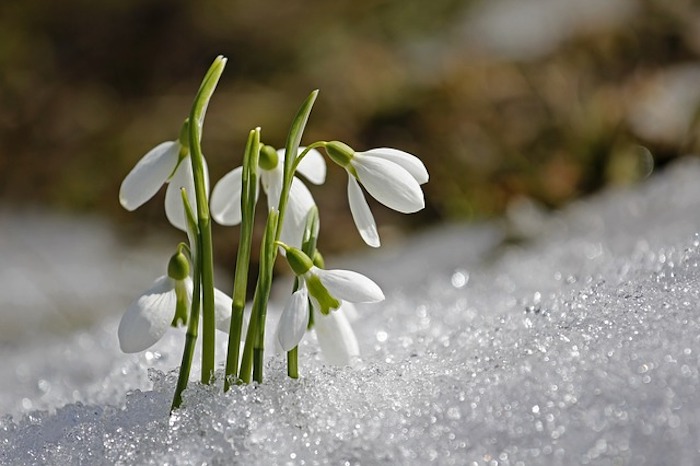
An early sign of spring, snowdrops are typically among the winter bloomers to burst through the earth’s soil. These dainty white flowers create a striking, dense bloom that multiplies through the spreading bulbs.
These perennial flowers will survive the cold weather in even the coldest of regions making them a must for any gardener looking to plant something to keep their garden alive even in the dead of winter.
Plant type: Bulb, perennial
USDA Hardiness Zone: 4-7
Flower color: Green, white
Flower bloom season: Winter, Spring
Attracts: Bees
Fragrant: No
Maintenance: Low
Light: Full sun, partial shade
Soil texture: Clay, high organic matter
Soil pH: Acid, alkaline, neutral
Soil drainage: Good, moist, occasionally wet
8. Winter Daphne (Daphne odora)

The pale pink flowers of this evergreen give off a gentle, sweet, and spicy scent. Butterflies are attracted to the nectar of this winter-blooming flowering shrub. It’s a great option for climates that often go back and forth from warm days to cold days.
This plant will brighten any winter landscape with its showy flowers blooming in pink, lavender, or white in mid-to-late winter. Winter Daphne is somewhat salt-tolerant and prefers well-drained soils.
Plant type: Shrub, poisonous
USDA Hardiness Zone: 7-9
Flower color: Pink, purple/lavender, white
Flower bloom season: Winter, Spring
Attracts: Bees, butterflies, moths, pollinators
Fragrant: Yes
Maintenance: Low
Light: Full sun, partial shade
Soil texture: High organic matter, loam
Soil pH: Acid, alkaline, neutral
Soil drainage: Good, moist, occasionally dry
9. Winter Jasmine (Jasminum nudiflorum)
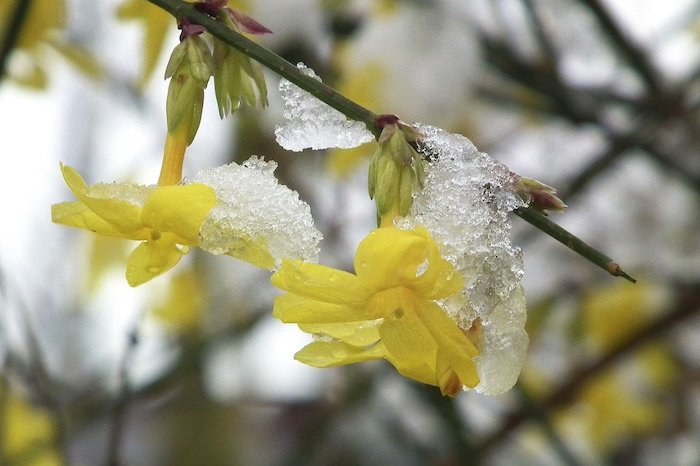
Beat the winter gloom with budding winter jasmine. These shrubs burst with bright yellow flowers in the winter and are favored by gardeners for their low-maintenance care.
While most jasmine flowers feature beautiful scents, you won’t be smelling these winter jasmine anytime soon. Unlike the rest of their family, winter jasmines aren’t fragrant flowers.
Plant type: Ground cover, shrub, vine
USDA Hardiness Zone: 6-10
Flower color: Gold/yellow
Flower bloom season: Winter, Spring
Fragrant: No
Maintenance: Low
Light: Full sun, partial shade
Soil texture: Clay, loam, sand
Soil pH: Acid, alkaline, neutral
Soil drainage: Good, moist
10. Witch Hazel (Hamamelis mollis)

Witch hazel is popular for its low maintenance, attractively textured blooms, and high resistance to pests and disease. Its sweet fragrance cuts through the crisp cold air, giving your nose quite the delight as you step outdoors.
These deciduous trees are also known for their medicinal and cosmetic properties. It’s most popular as a topical botanical. It’s been used as an anti-inflammatory, antioxidant, and radiation-protectant. Many very popular skin care products also use witch hazel such as Revlon, Neutrogena, L’Oreal, and Estee’ Lauder.
Plant type: Shrub, tree
USDA Hardiness Zone: 5-8
Flower color: Brown/copper, Gold/yellow
Flower bloom season: Winter, Spring
Attracts: Small mammals, songbirds
Fragrant: Yes
Maintenance: Low
Light: Full sun, partial shade
Soil texture: High organic matter
Soil pH: Acid
Soil drainage: Good, moist, occasionally wet
FAQ about winter flowers that bloom in the cold
What is the most popular winter flower?
Snowdrop is by far the most popular winter flower. Valued for its showy white petals, even snow won’t scare off these flowers, making them a favorite among winter gardeners.
What other types of plants do well during the winter?
Certain shrubs and trees tend to thrive during the colder months of the year.
- Holly
- Red twig dogwood
- Agave
- Sarcococca confusa
- Skimmia Japonica
- Mahonia
- Juniper
Some vegetables and herbs also do well in the winter, as well.
- Broccoli
- Kale
- Carrots
- Peas
- Chives
- Rosemary
- Oregano
How do you keep flowers alive in the winter?
Generally, there are three keys to keeping flowers alive any time of the year, but particularly during the winter.
- Planting for your USDA Hardiness Zone.
- Planting in the correct areas for proper sunlight.
- Understanding the level of care your plants need.
How do you landscape for winter?
Adding pops of color to your garden with our above list of flowers that bloom in the cold is a great place to start your winter landscaping. Continue with these landscaping ideas:
- Build a fire pit: There’s nothing better than the sounds of a crackling fire on a cold winter night while roasting marshmallows.
- Design a year-round garden: Consider establishing a Zen garden if you live somewhere too cold even for cold-weather flowers. A Zen garden can include bonsai trees, bamboo, rhododendrons, or ornamental grasses.
- Light things up: Everything always seems so much more magical with a string of lights to add a glow to the evening.
Ready for a splash of color this winter?
When you want the perfect wintery landscape in your backyard, sometimes you need the advice of a professional. A gardener can help choose flowers that best accentuate your yard, and they can determine where these flowers will flourish.
Call a professional gardener near you if you need assistance with landscaping design, installation, or maintenance.
Main image credit: Efraimstochter | Pixabay